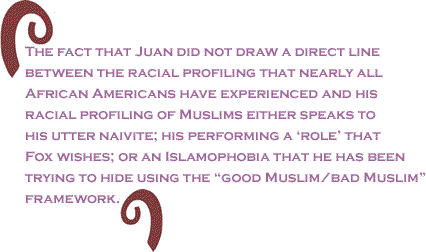|
I
met Juan Williams several years ago when he and I were involved
in a panel debate. What struck me about Juan was how he
carried himself after the debate was completed.
During the debate he was articulating his center-right politics,
and was quite energetic in his approach. At the end of
the debate, however, Juan became a different person. He
was warm, friendly, and seemed to have no antagonism towards
me, despite the fact that we had been at odds. At that
moment I realized that Juan Williams, more than anything
else, was and is a performer. He is performing a role.
When he is “in character”, he is everything that Fox News
wants. In playing that role he is well compensated. As
a result, I have no idea what he actually believes or actually
why he says many of the things that he says.
When word broke about his termination by NPR I had contradictory
feelings. I listened to what he had said and thought about
how he COULD have used the opening to discuss Islamophobia
and the need to struggle against it. Juan chose not to
do that. While he threw the public a bone by referencing
a distinction between extremists Muslims and moderate Muslims,
the bottom line was that he was supporting racial profiling.
Had I not just completed reading Charles Ogletree’s excellent
The
Presumption of Guilt: The Arrest of Henry Louis Gates, Jr.
and Race, Class and Crime in America I might not have thought about how outrageous it
was that a black Juan Williams would engage in open, and
unapologetic racial profiling. Yet everything that Juan
said could have (and probably has) been used by white Americans
to describe various phobias that many of them have about
African Americans. How many times, as a black person, has
Juan walked near white people who hold their packages closer
to their bodies? How often has he been stopped by the police
for questioning when he has not resembled any suspect (assuming
that there was a suspect)?
I might not have thought about how outrageous it
was that a black Juan Williams would engage in open, and
unapologetic racial profiling. Yet everything that Juan
said could have (and probably has) been used by white Americans
to describe various phobias that many of them have about
African Americans. How many times, as a black person, has
Juan walked near white people who hold their packages closer
to their bodies? How often has he been stopped by the police
for questioning when he has not resembled any suspect (assuming
that there was a suspect)?

The fact that Juan did not draw a direct line between the
racial profiling that nearly all African Americans have
experienced and his racial profiling of Muslims either speaks
to his utter naivite; his performing a ‘role’ that Fox wishes;
or an Islamophobia that he has been trying to hide using
the “good Muslim/bad Muslim” framework.
Whatever the source, Juan stepped over the line, and in the
media there is a line. Ask Helen Thomas, the legendary
White House reporter whose inappropriate, off-color remarks
about Jewish Israelis (certainly uttered in a moment of
frustration since she had no history of anti-Jewish rants),
led to her being forced to retire. If Helen Thomas was
forced to step aside because of her remarks, then why should
any quarter be given to Juan Williams? Sure, Juan should
have and could have apologized to the public. Perhaps had
he IMMEDIATELY apologized and tried to use that as a ‘teachable’
moment, it would have been appropriate to offer forgiveness.
But that is not what happened; not even close. Instead,
Juan received a bonus deal from Fox and went on the attack
mode against NPR and liberal media outlets.

I probably would also not have been as affected by this incident
had it not been for the continuous onslaught of anti-Muslim,
anti-Arab vitriolic rhetoric in the mainstream media. If
we could box in this irrationalist nonsense, it would still
be an insult to anyone with any degree of morals and integrity.
But Islamophobia is not restricted to obscure websites or
late night radio programs. It seems to pervade every aspect
of US society and is tolerated as long as the speaker sounds
educated or plays to 9/11 sadness.
Juan took the approach of the moth circling the flame. He
has been flitting around the demagoguery of the political
Right for a long time without getting singed. Last week
he flew too close and finally became one with the flames.
BlackCommentator.com Editorial Board member, Bill Fletcher, Jr., is a Senior Scholar with
the Institute for
Policy Studies, the immediate past president ofTransAfrica Forum and co-author of, Solidarity Divided: The Crisis in Organized Labor and a New Path
toward Social Justice (University of California Press), which examines
the crisis of organized labor in the USA. Click here to contact Mr. Fletcher.
|

